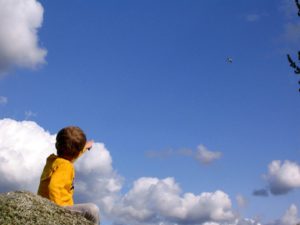By Freya Secrest
“Think like a planet.” What does it mean to think like a planet? David Spangler has used this idea to introduce a way to access the stance of partnership and participation that will help us create a more whole future. But I can be so immersed in my own daily events that I cannot even begin to imagine the thoughts that a planet might use to organize itself. How can I develop the capacity to hold such a wide perspective?
On a recent plane flight looking out the window with a vista from 30,000 feet up, I found at least a partial answer to that question. I found myself marveling at the folds, patterns and shapes of the land we were crossing over. I could see the movement of time and relationship as mountain evolved into foothill and from there into valleys with fields and towns.
My felt experience in nature often allows me to find the vocabulary that helps to navigate more conceptual understanding. Most often that wider, more expansive understanding comes when marveling at a detail like the pattern of bark or the color of a sunset. But the view of our world from 30,000 feet up brought me to see and feel a wider range of our evolving planet from a new and very accessible viewpoint. It brought me from an image of a planet as a neutral hunk of rock to a more intimate experience of its relationship to aliveness and joy.
Let me try to invite you into the picture as it engaged me.
First, imagine yourself gazing out the window of an airplane. The sky is cloudless and you can see clearly the mountains and foothills below. You are moving fast enough to recognize the progression in the landscape below but not so fast as to miss the relationship between its elements.
So close that they feel touchable, notice first the jutting peaks of mountains. Rock – just the weight of the word communicates its to-the-point honesty. The word brings a satisfying felt description of the base layer of our planet. It is solid; it will not be pushed aside. Rock can be cold and slippery and hard but it also upholds. And with time, rock gives way to water and wind, allowing itself to be rounded and softened.
Flying on, your view softens into foothills where the flows and patterns of rock become more entwined. The word Earth comes to mind. It brings a different quality, varied and not so singular. Earth has learned to be collective and interactive. There are more shades of light in the ground below.
And now between the hills you see spaces of green – valleys where earth has softened into a seedbed. By honoring its relationships it has become Soil, nourishing, sustaining fertile ground for other lives. Soil blends and integrates to form a physical field of emerging life, an energetic field of invitation.
The scope of this awareness is wide. Rock speaks of identity and being. Earth speaks of relationship and Soil to renewal. They speak to thinking like a planet.
[Come back to an awareness of yourself. Do you notice a deeper sense of the life of our world?]
I am moved to be both a witness and a part of this majestic progression of life. I wonder what I can possibly contribute to the breadth of this planet-scaled experience. A response comes up in me. I have an image of Seeds and a thought that says, “You add seeds, seeds of possibility that offer new harmonies to the song. New seeds to grow and shape new stories of life and your attention to the husbandry that will integrate that life into the joy of our planetary aliveness.”
Thinking like a planet needs me to accept the invitation to become part of the progression of emergence on this planet, embrace the connections that shape the field of life, and welcome the changes that time and relationship bring.
Views from the Lorian Community publishes essays from a team of volunteer writers expressing individual experiences of a long term, committed practice of Incarnational Spirituality (and the general principles shaping such a practice.) Views expressed do not necessarily reflect the sentiments or thoughts of any other person in Lorian or of Lorian as a whole. If you would like to subscribe, please visit our website and click on Follow Our Blog Via Email. Or email the editor:drenag@lorian.org.


